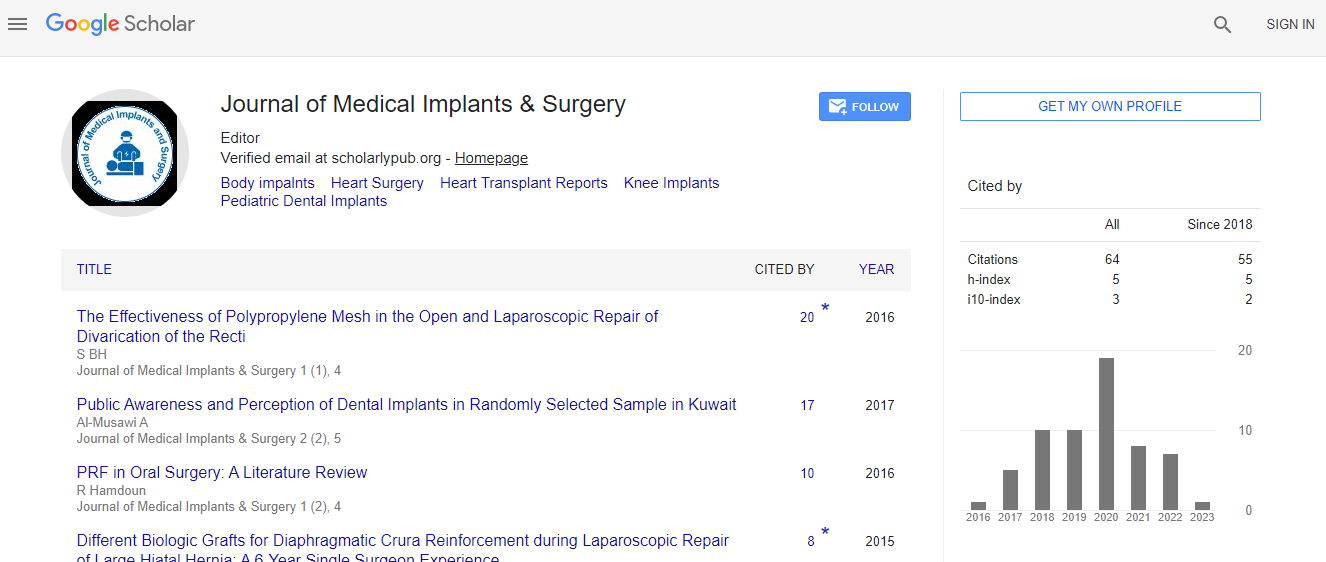Public Awareness and Perception of Dental Implants in Randomly Selected Sample Kuwait
Abstract
The growing success of dental implants
has made this treatment mode increasingly more
popular for the replacement of missing teeth. The
aim of this study was to assess public awareness and
determine patient’s expectations concerning dental
implants through requisite information on treatment
mode, prior to presenting for professional consultation
on dental implant, as a treatment option. Materials
and methods: In a cross-sectional survey, 527
adult participants were interviewed, through random
selection from attendance at public places. A
structured questionnaire, with multiple-choice questions,
was used to obtain the participants’ level of
knowledge on dental implants, including the source
of information on which they based this knowledge,
their reasons to accept or reject dental implant treatment,
as well as their understanding of the procedures
involved. Results: In all, (96.4%) of participants
had heard of dental implants, and (79.2%) were willing
to learn more about dental implants. Almost,
two-third (64.9%) of the respondents thought dental
implant to be the healthiest treatment mode for
missing teeth. Maximum (33.9%) participants gathered
dental implants information through media,
followed by friends or social gatherings (24%), dental
clinics (23.3%), and family (18.8%). Significantly
more females than males, and more Kuwaitis than
non-Kuwaitis expressed, ‘Good looking’, the reason
for acceptance for dental implants (p<0.05). Conclusion:
This study revealed a high level of awareness
among public, but lack of knowledge on procedural
aspects. The study also revealed the need for specialists
in this field to spread awareness and relevant
information concerning dental implants among the
general public.
Introduction: Dental implant is increasingly becoming
a widely accepted treatment approach in
dentistry for the replacement of missing teeth. The
success and good prognosis of this treatment has
made it very popular among the dentists, offering
implant-supported rehabilitation to patients having
lost teeth, or those with severely compromised bone
structure [1-5]. Though oral reconstruction has been
going on since late 1950s with the intra-oral use of titanium
implants, the public perception of this mode
of treatment has largely remained unmeasured,
despite reported improvements in patients treated
with implant-supported prosthesis. Several studies
from different countries do report the level of patients’
understanding and awareness concerning oral
implants [6-13]. However, in Kuwait, dental implant
treatment is relatively a new field, hence, public perception
of this treatment has never been studied.
Being a novel approach, and a surgical intervention,
public invariably remains apprehensive of the associated
complications, despite the potential benefits of
this treatment regimen in tooth-restoration, improving
patients aesthetics, self-confidence and quality
of life.
From clinicians’ experiences in Kuwait, the suggested
option of dental implant for replacing missing tooth
is often met with reluctance among patients, fearful
of surgical outcomes. The basis of our study is inherent
in this widespread hesitancy and fear syndrome
among the public, making it imperative to probe the
extent of public perception and awareness concerning
the dental implant treatment in Kuwait. The study
is first of its kind, and expected to generate baseline for mapping a strategy for orienting and educating
the public on the positive implications of this field
of dentistry in Kuwait, in addition to contributing to
existing knowledge in the field from this part of the
world.
Vast literature exists in the field of dental implants,
covering various aspects of this treatment approach,
including treatment planning, surgical placement,
survival rate, success rate, patient-satisfaction concerning
the treatment outcome, etc. [14-21]. Yet,
few studies have reportedly been attempted on the
patients’ perception of the surgical procedures associated
with dental implant placement. The aim of this
study was to assess public awareness, determine patients’
expectations, and enhance their understanding
of procedural implications through requisite information
about dental implants, prior to presenting
for professional consultation on dental implant as a
treatment option [22,23].
Materials and Methods
A cross-sectional survey, among 527 participants was
conducted in the general public through personal
interviews utilizing a structured questionnaire with
multiple-choice questions, during a period of four
months - Oct 2014 to Jan 2015. The targeted subjects
were randomly selected from attendance at
local malls, supermarket and food convention open
for the general public. The questionnaire included
personal data, level of education, and a brief dental
history. The questions were intended to solicit the
level of participants’ knowledge concerning dental
implants, and the source of information on which
they based this knowledge. All the four interviewers
in the survey had dental background, and the questionnaire
was both in Arabic and English, used as per
the subject language preference.
Statistical analysis
The data management, analysis and graphical presentation
were carried out using the computer software
‘Statistical Package for Social Sciences, SPSS
version 22.0’ (IBM Corp, Armonk, NY, USA). The descriptive
statistics has been presented as number
and percentage for categorical variables, and mean
± standard deviation (SD) for continuous variable,
age. Chi-square or normal Z-test, for comparing two
proportions, was applied to find any association or
significant difference between categorical variables.
The two-tailed probability value ‘p’
Acceptance or refusal to dental implant treatment
Of the total respondents, 74.6% enlisted their acceptance
of the dental implant treatment, 20.8% were
not receptive to this treatment mode, and 4.6% did
not respond. More females than males (81% vs. 75%)
and more Kuwaitis than non-Kuwaitis (80% vs. 76%),
showed their willingness for dental implants.
Perception towards dental implants
Placement: Almost two-third of the respondents
(64.6%) considered implant placement as a difficult
procedure, while remaining 35.4% considered it to
be a simple procedure (Table 2). As many as 43.3%
respondents considered it to be a very painful procedure
at the time of placement, compared to 56.7%
who thought it to be comfortable with no pain, but
on the contrary, a higher percentage (54.1%) of respondents
thought the procedure to be more painful
after the implant placement, in comparison to 45.9%
who found the procedure comfortable with no pain.

 Spanish
Spanish  Chinese
Chinese  Russian
Russian  German
German  French
French  Japanese
Japanese  Portuguese
Portuguese  Hindi
Hindi 